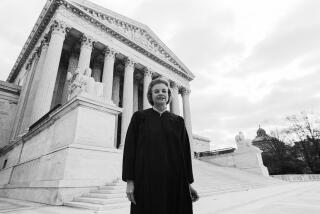Black Rights Advocate: 32 Years on Bench
- Share via
NEW ORLEANS — Nothing short of catastrophe stops 84-year-old John Minor Wisdom, now in his 32nd year as a federal appeals court judge.
It hurts to watch him walk. A slight man, stooped and gray, he creaks along, leaning heavily on a cane. Both knees are artificial; arthritis ruined the ones he was born with. Surgeons rummaged around inside his chest recently to repair a major artery in his heart. His aorta was about to blow out like an old inner tube. Surgery cost him six weeks in a hospital and a month at home.
But being stuck in bed didn’t mean not working for Wisdom, a member of a special three-judge court handling still another racial desegregation case.
Court fights involving race have been a large part of his working day since he was appointed to the U.S. 5th Circuit Court of Appeals by Dwight D. Eisenhower in 1957. He nearly always came down on the side of blacks fighting segregation.
“The more exposure you get to this problem, the more you realize that the blacks have had a raw deal for 300 years and that we owe a debt to them.”
Wisdom and one or more of three other judges with similar outlooks--Elbert Tuttle of Atlanta, John Brown of Houston and Richard Rives of Montgomery, Ala.--got most of the racial cases, and were dubbed “The Four” by their brethren.
Four landmark decisions, written by Wisdom in 1965-67, whipped the crawl of school desegregation to a gallop. Instead of the “all deliberate speed” pace of the Supreme Court, the 5th Circuit imposed immediate affirmative action.
When he was appointed to the court, John Minor Wisdom seemed more like a contented member of the upper crust than likely to shake up the Deep South. “I was much more moderate than I am now. It was a gradual progression in my philosophy,” he said.
Wisdom’s ancestors came in the 1840s from Virginia and Kentucky. He was born in New Orleans in 1905, graduated from Washington & Lee University, studied English at Harvard for a year, took law at Tulane.
Political activism was Wisdom’s road to the bench. At the 1952 Republican National Convention in Chicago, he led a fight to have Eisenhower delegates from Louisiana seated instead of delegates committed to Ohio Sen. Robert Taft. The victory was the turning point in Eisenhower’s bid for the nomination.
Buses full of tourists used to pause in front of the Wisdom mansion while the tour guide exalted him as the man who made Eisenhower President.
In return, Eisenhower kept Wisdom from becoming a much richer man. At the time of his appointment to the 5th Circuit, he was a founding member of what is still one of the city’s biggest, busiest law firms.
While decreeing racial integration for others, Wisdom did not change his own social habits. He remained a member of exclusive all-white, all-male clubs. Such conflict with his legal views does not disturb him.
“I can’t change their minds,” he said, “and they can’t change mine.”
“I took a lot of kidding,” he recalled recently. “One fellow, every time he saw me would say, ‘Hey, John, what have you done to us white folks today?’ ”
Amiable jibes weren’t enough for some. Wisdom found rattlesnakes on his lawn. Two of his dogs were poisoned. “For years they tried to keep me awake nights. I’d get telephone calls between one and four o’clock in the morning. We couldn’t take the phone off the hook because we had two kids off at school and we felt they should be able to get hold of us.”
Hostilities stayed at the harassment level. Wisdom never bothered to ask for police protection, “and to my knowledge I was never given protection,” he said. “My office door was open, just like it is now.”
Despite age and aches, Wisdom still works. In 1977, he stepped back to senior status--semi-retirement, which meant that administrative duties were eliminated. But he hears as many cases as ever and often sits on other circuits.
“I sit all over the place,” he said. “I go to San Francisco, to New York, Washington, Chicago. But I am going to lessen up over the coming year.”
More to Read
Sign up for Essential California
The most important California stories and recommendations in your inbox every morning.
You may occasionally receive promotional content from the Los Angeles Times.










